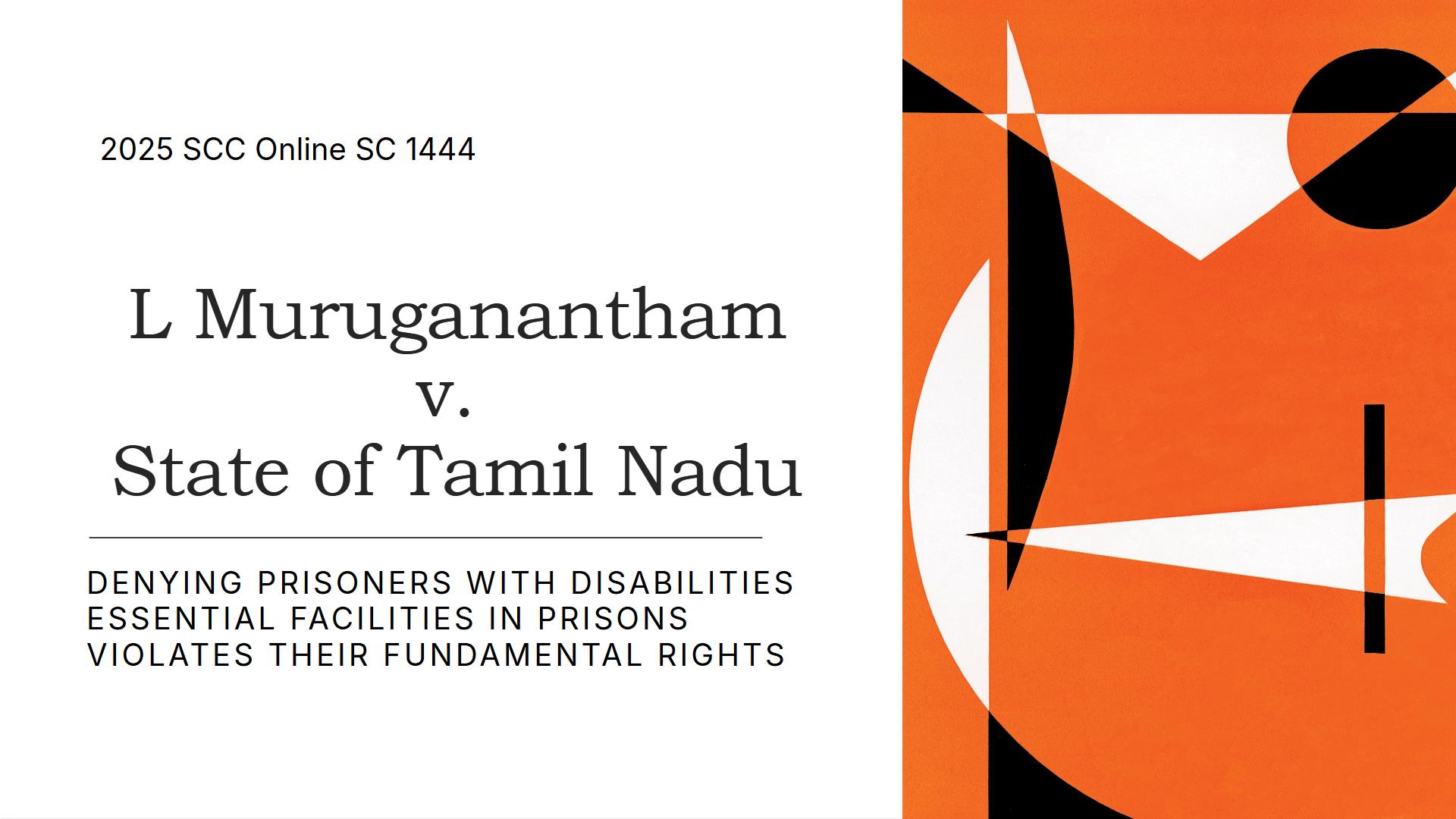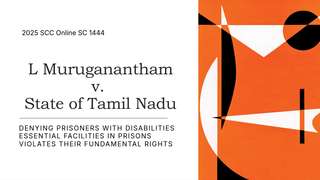Case Summary of L Muruganantham v. State of Tamil Nadu

Denying prisoners with disabilities essential facilities in prisons violates their fundamental rights
Respondent 2 Police officer, Respondent 3 Central Prison, Coimbatore
Coram: J.B. Pardiwala and R. Mahadevan, JJ.
Judgment delivered by R. Mahadevan, J.
Decided On: July 15, 2025
Citation: 2025 SCC Online SC 1444
Table of Contents
Summary
The Supreme Court of India addressed the appeal by L. Muruganantham against the State of Tamil Nadu, focusing on the alleged human rights violations during his incarceration, particularly concerning his disability. The Court upheld the High Court's decision to enhance compensation from Rs. 1,00,000 to Rs. 5,00,000 for the violations by the police, while dismissing claims against prison authorities due to lack of evidence of deliberate neglect. The Court emphasized the need for systemic prison reforms to accommodate prisoners with disabilities, referencing the Rights of Persons with Disabilities Act, 2016, and international standards, and issued comprehensive directives for improving prison conditions and ensuring compliance with disability rights. The appeal was disposed of with these directions.
Facts
L. Muruganantham, an advocate, suffers from Becker Muscular Dystrophy, a progressive locomotive disability, assessed at 70% in 2013 and 80% in 2020. He also claims to suffer from autism and mental illness.
The appellant alleged he and his mother were falsely implicated in a criminal case by a henchman of his paternal uncle, with an ulterior motive to coerce property transfer. He was arrested on February 29, 2020, by Respondent No. 2 and remanded to judicial custody.
During his incarceration at Central Prison, Coimbatore (February 29, 2020, to March 10, 2020), the appellant alleged that Respondent No. 3 (prison authorities) failed to provide proper food, medical treatment (physiotherapy, psychotherapy), accessible facilities (ramps, accessible toilets), and a low sensory environment, leading to a deterioration of his physical and mental health.
SHRC: The appellant filed a complaint with the State Human Rights Commission (SHRC) seeking ₹50,00,000 in compensation and ₹2 crores to the Disability Rights Public Fund. The SHRC awarded ₹1,00,000 compensation and recommended disciplinary action against Respondent No. 2, but dismissed the complaint against Respondent No. 3. The SHRC also recommended making all prisons accessible for persons with disabilities as per the Rights of Persons with Disabilities Act, 2016.
High Court: The appellant challenged the SHRC order in the High Court, seeking enhanced compensation and implementation of the RPwD Act, 2016. Respondent No. 2 also filed a petition challenging the SHRC's findings. The High Court partly allowed the appellant's petition, enhanced the compensation to ₹5,00,000 (₹4,00,000 from the State, ₹1,00,000 from Respondent No. 2), and awarded ₹25,000 as costs to the appellant. However, the High Court observed that while the arrest and initial treatment could be a human rights violation, the non-provision of certain amenities during the short incarceration period would not amount to a “serious Human Rights violation” by jail authorities.
Constitutional and Legal Rights of PWDs
Fundamental Rights Violations: Article 14 (Equality before law) and Article 21 (Right to life and personal liberty) are directly infringed when basic care is denied.
The Court affirmed that incarceration does not justify the denial of dignity, humane treatment, or necessary accommodations
RPwD Act, 2016 Provisions:
- Section 6: Protection and safety in situations of risk, including custodial settings.
- Section 25: Access to healthcare, including preventive and rehabilitative services.
- Section 38: Mandates equal opportunity in all public services including law enforcement and justice systems.
International Commitments
Article 15 of the United Nations Convention on Rights of Persons with Disabilities (UNCRPD), to which India is a signatory, prohibits any cruel, inhuman, or degrading treatment of disabled persons in detention.
Article 31 of the UNCRPD, by maintaining and disseminating disaggregating statistical data regarding accessibility and accommodations for prisoners with disabilities on official websites, thereby ensuring transparency and accountability.
Rights of Persons with Disabilities Act, 2016
The RPwD Act, 2016 was enacted to implement the UN Convention on the Rights of Persons with Disabilities, which India ratified in 2007.
It replaced the earlier Persons with Disabilities (Equal Opportunity, Protection of Rights and Full Participation) Act, 1995.
According to Census 2011, there are 2.68 crore persons with disabilities in India which constitute 2.21% of the total population.
Expanded Definition of Disability: The types of disabilities have been increased from existing 7 to 21 in which for the first time Acid Attack Victims, Blood diseases like Haemophilia & Sickle Cell Anemia among others have been included.
Rights and Entitlements: Appropriate governments are responsible for ensuring equal rights for persons with disabilities. It also provides additional benefits for individuals with benchmark disabilities and those requiring high support, including a minimum 5% reservation in higher education, 4% in government jobs, and 5% in land allotment.
Mandates for Public Buildings: The Rights of Persons with Disabilities Rules, 2017 require the central government to set accessibility standards for persons with disabilities across public buildings, transport, and ICT infrastructure.
SC's Findings
The Supreme Court noted that both the SHRC and High Court unequivocally found the appellant's FIR, arrest, and incarceration to be illegal and motivated by the paternal uncle's desire to usurp property, with authorities failing to consider his disability.
Regarding compensation, the Court observed that while the appellant did not receive certain appropriate medical and dietary facilities, he was in the prison hospital and received some special amenities. The Court found that the absence of specific provisions like protein-rich food or specialized medical interventions stemmed from "institutional limitations within the prison system rather than from any deliberate neglect or malice on the part of the prison authorities".
Therefore, these shortcomings do not per se amount to a human rights violation attributable to jail authorities. The mere non-supply of preferred or costly food items cannot ipso facto be treated as a violation of human rights.
The Court upheld the High Court’s decision not to further enhance the compensation, implicitly agreeing that the prison authorities actions, while imperfect, did not constitute a separate “human rights violation” in terms of "deliberate neglect or malice" beyond what was already compensated for the illegal arrest and initial treatment.
SC's Directives
Identification of Prisoners with Disabilities: Prison authorities must promptly identify prisoners with disabilities at admission, allowing them to declare their condition and specific needs.
Universal Accessibility: Rules and essential prison information must be provided in accessible formats like Braille, large print, sign language, or simplified language, ensuring universal accessibility. Prisons must have wheelchair-friendly spaces, accessible toilets, and ramps to ensure universal accessibility.
Therapeutic Facilities: All prisons must have dedicated spaces for physiotherapy, psychotherapy, and other essential therapeutic services.
Access Audit: A State-level access audit of all prisons in Tamil Nadu must be completed within six months by an expert committee including officials from the Social Welfare Department, the Department for the Welfare of Differently Abled Persons, and certified access auditors.
Training of Prison Officials: Prison staff should undergo training and sensitization on the needs of prisoners with disabilities to promote a compassionate and informed approach.
Update Prison Manual: The State Prison Manual shall be reviewed and appropriately amended within six months to ensure conformity with the RPwD Act, 2016 and the UNCRPD.


Comments